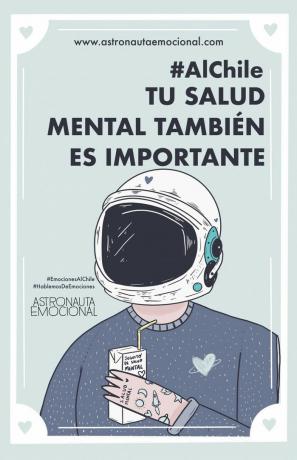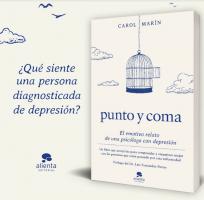Lizbeth García: "It is important to talk more about emotions"
Few people would question that emotions are a very important part of our lives. However, for a long time, it has been assumed that in many situations these must be totally repressed in favor of supposed moral mandates or the need to gain social acceptance. He intended to act as if the emotional were a fiction.
Fortunately, over time, we have become aware that converting emotions (and, above all, the so-called "negative emotions") in a taboo not only does not make sense, but it is harmful. But even today there are still remains of those social dynamics anchored in tradition and the roles in which the emotional is fought and punished.
Because, on the occasion of World Mental Health Day, psychologists and psychologists like our interviewee today, Lizbeth García, propose to give much more visibility to our emotional side.
- Related article: "Are we rational or emotional beings?
Interview with Lizbeth García: the #EmocionesAlChile campaign before World Mental Health Day
Lizbeth García is a clinical psychologist and founder of Astronauta Emotional
, one of the leading psychotherapy centers in Mexico City.Since his formation based on the cognitive-behavioral model and the gender perspective, he has been working for years both in the support individual patients, such as promoting and giving visibility to awareness-raising initiatives on mental health issues at a social and cultural. He does the latter from both the Emotional Astronaut social networks (his Instagram account has many followers) and from the podcast De Otro Planeta, dedicated to topics related to Psychology.
On this occasion, Lizbeth tells you about the campaign that Emotional Astronaut launches on the occasion of World Mental Health Day: #EmocionesAlChile. Through this hashtag, from which videos and images with references in Mexican folklore will be disseminated, she proposes to normalize the act of speaking openly about psychological problems Beyond stigmas, expressing emotions and preventing certain problems from becoming taboo instead of being addressed or giving rise to social or psychotherapeutic support situations.
Why is it still quite normal to hide our most intense emotions, or at least not talk about them?
There are multiple answers to this question, but I dare say that one of the most representative is that the emotions can be taken as a symbol of weakness or vulnerability and, under this perspective, those people who allow themselves experiencing them can receive disabling responses from those around them, or even by themselves and for this reason, it is preferred minimize them.
Another point is that sometimes the role that emotions have in our life is ignored (emotions as an interaction mechanism that "warn us" of the effects on we who have the internal and external situations that make up the day to day) and on the contrary they are seen as obstacles or hindrances in our experience human.
Under this logic, people prefer to "ignore" them by not talking about them, but that does not change that the emotions are still there. It is important to mention that these mechanisms of avoidance, minimization or attempts to ignore our emotions are usually more harmful than beneficial, so it is preferable to learn new methods of relating to our experiences emotional
It tends to be assumed that men must be cold people, who do not show feelings and emotions that can be associated with vulnerability. What role do gender roles play in this kind of self-censorship?
They have a very important role since gender roles traditional dictates that emotions are entirely a matter of the female gender and that man who show usually receives disqualifications in this regard (usually sexist disqualifications or homophobic).
It is evident that role-based parenting patterns in conjunction with the implicit presence of these gender roles in different scenarios of social interaction allow these ideas to be perpetuated throughout the lives of men, that the process of allowing whether or not to live their emotions is molded according to this homogeneous learning and that, therefore, it becomes consolidated as a part of the male identity.
Phrases as short as "crying is for girls" or "behave like a little man" often attribute that boys or men cannot (or should not) have emotional experiences, and although they will surely go Against these ideas it can be extremely adverse in some social contexts, currently movements that normalize emotions are beginning to be seen since they are not a question of gender, they are part of the human experience, and that is why it is necessary to speak of new ways in which men can relate to the emotional component that is undoubtedly present in their life.
What taboo topics about how we experience emotions are most prevalent today? Both within the field of mental health and outside of it.
That talking about emotions is only necessary when we can no longer deal with them, when they are very intense or annoying, and that at this time the task is to learn to control them. The reality is that no, we should not only talk about emotions when they are already too intense and neither we learn to control them, we only learn to regulate them and live with them in a more compassionate way, more quiet.
Another taboo is that there are good and bad emotions. The reality is that this polarity comes from the interpretation we give to our emotions and how annoying some can be. Emotions, however, each and every one of them communicate to us how we are faced with an event and therefore, they are important in our life.
Another taboo that we find and that is unfortunately perpetuated by public figures who sometimes talk about this issue for profit, is that the best possibility that we have before the emotions is always to try to see the positive side or to maintain ourselves with the best attitude in everything moment. It is not true.
While feeling sadness, fear or anger (to give just a few examples) is usually unpleasant, it is possible that these emotions are minimized if to face them we try to distort our vision into the extreme of positive attitude, why not try and allow ourselves to feel these emotions that are there for something? Why not integrate the nuances that make up our emotional experience?
This may sound strange "why would anyone want to be sad?", But it is not about whether or not we want certain emotions, but it is a fact that we will live them throughout our lives and therefore what better way than to learn better ways to feel them.
What are the most harmful consequences of not expressing what we feel?
Undoubtedly the emotions "seek" some method to be expressed or processed, then, those people who tend not to do so present undesirable behaviors that comply with this function and on multiple occasions have adverse consequences for their well-being or integrity, they begin to interfere with their activities or even in their way of relating to others persons.
At this point it is important to emphasize that it is not that people seek this type of less favorable mechanisms for the expression of emotions because they want to or because they are unable to foresee the possible adverse consequences: as we discussed previously, there is social patterns or cultural rules that govern this, and therefore, other more favorable management methods are not well known. emotional, or sometimes these more adaptive methods begin to take effect after a long term of their use.
For example, it is common that, when feeling stress or anxiety, people want to get rid of it and employ emotional relief mechanisms that have immediate (but long-term adverse) effects What drink alcohol, ingesting food without really being hungry or isolating yourself.
That is why it is important to talk more about emotions, and sometimes actions as small as noticing when we begin to experience them, writing them or even sharing them with someone you trust, can contribute to living with our emotions in a more warm.
This is not a minor job and it is also one of the reasons why there are professionals in the field, especially mental health professionals.
How can a campaign like #EmocionesAlChile help to make it easier for people to express their way of feeling?
It can be a first approach to normalize what happens to many of us, talk about what happens to more than one person and see it as they are: a part of us.
Of course, since it is a topic that is rarely discussed, it is important to do it from a perspective that is not family and that is why we decided to use many references from our popular culture that so much It represents.
#EmocionesAlChile is about seeing emotions not from the taboo or from that boring topic that only experts address, it is about recognizing that talking about them It can be an easy task, which we refer to with the words we use every day and more importantly: that there is more than one person feeling the same as your.

Finally... What advice would you give to a person who wants to help another to express their emotions without being paralyzed by fear or mistrust?
Social support is one of the most powerful tools we have to deal with difficult times, so the The simple fact of being present in the lives of those people who deal with a particular situation is of great help.
To provide this support it will always be important to take the perspective of the other as a starting point in order to really have an empathic perspective, and the empathy It is not necessarily about what we call “putting yourself in the other's shoes” but that even in the differences that we may have with the other, we make an effort to accompany him in what afflicts.
Perhaps we will never know for sure how each of the people live their emotions, but show interest and offer a space where they can express it without prejudices in between, it can be the first step for people to start talking about emotions.

